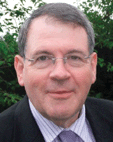DOI: 10.1039/C1CC90173G
(Profile)
Chem. Commun., 2012, 48, 23-23
Interview with Paul Raithby
Received
25th October 2011
, Accepted 25th October 2011
| ||||||
Do you remember what it felt like to publish your first ChemComm article?
Yes, my first ChemComm (DOI:10.1039/C39740000040) was my very first paper, and involved a crystal structure determination that I had carried out as a final year undergraduate project. I was very excited to have had a paper published and this launched a lifelong enthusiasm for a career in chemical research.How has your research evolved from your first to your most recent article?
My research has developed enormously since my first ChemComm. Although it is still based on X-ray crystallography, rather than determining the structures of crystals that have come out of a reaction, we are now determining the structures of molecules within crystals that may have only microsecond lifetimes. We are developing crystallographic techniques so that we can ‘watch’ reactions as they occur. We are fortunate that we have a grant that gives us access to the new Research Complex at Harwell and all the associate facilities at Diamond, ISIS and the Central Laser Facility, which will support us in achieving our target of ‘making molecular movies’.What do you like most about publishing in ChemComm?
There are several reasons that I like publishing in ChemComm. Firstly, the turnaround time is usually very good so that our work gets published quickly. Secondly, the articles are very professionally presented with the free use of colour. The journal style makes the articles easy to read and one can pick up the key points from the paper quickly.What aspect of your research are you most excited about at the moment?
Our photocrystallographic work is undoubtedly very exciting. The ability to be able to determine the full 3-dimensional structure of a molecule that may only be metastable or have a lifetime of microseconds or less is fantastic. We hope that, with the advances that we are making, this groundbreaking technique will be more widely used. In this way other research teams will also be able to make their own ‘molecular movies’ in order to learn more about chemistry ‘as it happens’.What is the best part of your job?
I thoroughly enjoy my research. I still love seeing new structures being solved and having the chance to think about how the new results fit into a pattern. I am very fortunate that crystallographic techniques have developed so much during my career and that we now have access to synchrotrons, with high intensity X-ray sources, that make experiments that we could only dream of a decade ago a real possibility. I also enjoy teaching at both the undergraduate and postgraduate level. Watching the students develop is very rewarding.What is the secret to success in scientific publishing?
I guess having some elegant science that allows you to tell a story and develop an idea in a paper is very helpful. The papers that I enjoy reading most are those that have both a ‘wow’ factor and develop a new idea.What is your advice to young emerging scientists?
Although it is tough becoming an academic at the moment my advice would be to keep trying. Perseverance is a very useful attribute to have, and if you couple that with scientific ability and good ideas, over a period of time you will succeed.What do you do in your spare time?
I do not seem to get much, but when I can I enjoy watching cricket and rugby, and summer holidays walking with my wife in the Swiss mountains are a highlight of the year.By the time I'm 100 I would like to have……
…published a thousand papers and helped chemists to meet the challenges of the 21st century.| This journal is © The Royal Society of Chemistry 2012 |

